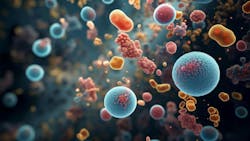The benefits of oral probiotics in periodontal treatment
Periodontal disease, a chronic inflammatory condition of the gums and supporting tissues of the teeth, is associated with an imbalance of the oral microbiota, leading to an overgrowth of pathogenic microorganisms. Traditional approaches such as scaling and root planing (SRP), rinses, and antibiotic therapy are commonly used to treat periodontal disease.
However, these treatments have limitations, such as antibiotic resistance and disruption of the oral microbiome. Probiotics, which are live beneficial microorganisms, have shown great promise in the modulation of the oral microbiome, reduction of inflammation, and improvement in clinical outcomes related to periodontal disease.
This article assesses the current scientific evidence supporting the use of probiotics as an adjunctive treatment for periodontal disease, with an emphasis on their mechanisms of action, effectiveness, and clinical outcomes.
Evidence supporting the use of probiotics in periodontal treatment
Modulation of the oral microbiome
The oral cavity is home to a complex and dynamic microbial ecosystem. There are more than 700 bacterial species that coexist in the oral cavity. Dysbiosis, or microbial imbalance, is a trait of periodontal disease, with pathogenic bacteria such as Porphyromonas gingivalis and Fusobacterium nucleatum contributing to inflammation and tissue destruction.
Probiotics, particularly strains such as Lactobacillus reuteri, Lactobacillus salivarius, and Bifidobacterium species, have been shown to modulate this microbial balance. These beneficial bacteria can compete with pathogenic species for adhesion sites on the oral mucosa and the teeth, thereby inhibiting the colonization of harmful microbes.
Additionally, probiotics produce antimicrobial compounds such as organic acids, hydrogen peroxide, and bacteriocins that further inhibit the growth of periodontal pathogens.1,2 For example, L. reuteri has been shown to outcompete some pathogenic species by occupying adhesion sites and lowering their populations.3
Anti-inflammatory effects
In periodontal disease, inflammation plays a central role in the destruction of the gums and bone. Probiotics are thought to modulate host immune responses, reducing the production of proinflammatory cytokines. Studies have shown that certain probiotic strains, particularly L. reuteri, can reduce levels of interleukin-1 beta (IL-1β) and tumor necrosis factor-alpha (TNF-α), both of which are involved in the inflammatory processes of periodontal tissues.4
For example, research has demonstrated that L. reuteri supplementation significantly reduces gingival inflammation by lowering the expression of proinflammatory cytokines and reduction of inflammatory infiltrate after performing SRP and taking probiotics.5 Despite research showing the positive impact on periodisease treatment, more research is needed to reach a consensus about the best bacterial strain that has the most effect.
Besides L. reuteri, evidence shows that L. paracasei strains, L. salivarius, Lactobacillus plantarum, Lactobacillus rhamnosus, and Lactobacillus brevis can be potentially beneficial in view of their anti-inflammatory characteristics.6-8 Another species, Bifidobacterium, can add a positive impact on periodontal disease. By modulating the immune response, probiotics help reduce gingival inflammation, prevent further tissue damage, and enhance the healing of periodontal tissues.9
Improvement in clinical parameters
Clinical parameters of periodontal disease, such as bleeding on probing (BOP), pocket depth, and clinical attachment level (CAL), are used to assess the severity of the condition. Several clinical trials have evaluated the effect of probiotics on these parameters. Probiotics have been shown to reduce BOP, a key indicator of gingival inflammation; improve pocket depth and clinical attachment level; and reduce (65% reduction; p < 0.05) the number of Streptococcus in patients with gingivitis and periodontitis.10
For instance, a clinical trial involving L. reuteri found that patients who received probiotic supplementation had significant reductions in BOP and probing depth compared to those who only received conventional periodontal treatment.9 The improvement in these parameters suggests that probiotics can positively influence periodontal health by reducing the presence of inflammatory markers and promoting tissue healing.
Enhancement of oral immunity
Probiotics also help strengthen the local immune response in the oral cavity. For example, certain probiotic strains can stimulate the production of secretory immunoglobulin A (IgA) in saliva, which plays a critical role in the first line of defense against oral pathogens.1 Studies have shown that Lactobacillus strains, such as Lactobacillus GG and Bifidobacterium lactis Bb-12, can increase IgA levels, enhancing the mucosal immune system and helping to reinvent the overgrowth of pathogenic bacteria in the oral cavity.11 By enhancing oral immunity, probiotics help the body resist infections that may exacerbate periodontal disease and support the regeneration of healthy oral tissues.
The use of oral probiotics as an adjunctive therapy in periodontal treatment shows promise based on current clinical evidence. Probiotics can help restore the balance of the oral microbiome, reduce gingival inflammation, and improve key clinical parameters associated with periodontal disease. While probiotics should not replace traditional periodontal treatments, they represent a valuable tool for enhancing the overall outcomes of periodontal care.
Further research, particularly large-scale and long-term studies, is needed to establish standardized protocols for the use of probiotics in periodontal therapy. However, given their low-risk profile and potential benefits, probiotics are an exciting addition to the evolving field of periodontal treatment.
References
1. Hindia B, Kumar VJ. The role of probiotics in oral health. Int J Pharm Bio Sci. 2014;4(5):446-450. https://www.ijpbs.net/abstract.php?article=MzYzNw==
2. Sgolastra F, Ortu E, Barone A, et al. Salivary Streptococcus Mutans and Lactobacillus spp. levels in patients during rapid palatal expansion. Europ J Ped Dent. 2014;15(3):271-274.
3. Tejinder PS, Gurpreet K, Kapila S, Malik RK. Antagonistic activity of Lactobacillus reuteri strains on the adhesion characteristics of selected pathogens. Front Microbiol. 2017;8(3):486. doi:10.3389/fmicb.2017.00486
4. Agossa K, Dubar M, Lemaire G, et al. The effect of Lactobacillus reuteri on gingival inflammation and composition of the oral microbiota in patients undergoing treatment with fixed orthodontic appliances: study protocol of a randomized control trial. Pathogens. 2022;11(2):112. doi:10.3390/pathogens11020112
5. Garcia VG, Miessi DMJ, da Rocha TE, et al. The effects of Lactobacillus reuteri on the inflammation and periodontal tissue repair in rats: A pilot study. Saudi Dent J. 2022;34(6):516-526. doi:10.1016/j.sdentj.2022.05.004
6. Vicario M, Santos A, Violant D, Nart J, Giner L. Clinical changes in periodontal subjects with the probiotic Lactobacillus reuteri Prodentis: a preliminary randomized clinical trial. Acta Odontol Scand. 2013;71:813-819. doi:10.3109/00016357.2012.734404
7. Ahmed S, Hoon J, Mun H, Yang C. Evaluation of Lactobacillus and bacillus-based probiotics as alternatives to antibiotics in enteric microbialchallenged weaned piglets. Afr J Microbiol Res. 2014;8:96-104. doi:10.5897/AJMR2013.6355
8. Hojo K, Mizoguchi C, Taketomo N, et al. Distribution of salivary Lactobacillus and Bifidobacterium species inperiodontal health and disease. Biosci Biotechnol Biochem. 2007;71:152-157. doi:10.1271/bbb.60420
9. Vivekananda MR, Vandana KL, Bhat KG. Effect of the probiotic Lactobacilli reuteri (Prodentis) in the management of periodontal disease: a preliminary randomized clinical trial. J Oral Microb. 2010;2(1). doi:10.3402/jom.v2i0.5344
10. Navidifar T, Alipourkermani A, Alipourkermani A, etc. Clinical efficacy of probiotics on oral health: a systematic review of clinical trials. Curr Pharm Biotechnol. 2023;24(15):1916-1927. doi:10.2174/1389201024666230405135457
11. Rautava S, Arvilommi H, Isolaur E. Specific probiotics in enhancing maturation of IgA responses in formula-fed infants. Pediatr Res. 2006;60:221-224. doi:10.1203/01.pdr.0000228317.72933.db
About the Author

Ella Peshkova, PhD, CRDH
Ella Peshkova, PhD, CRDH, is a dentist from Russia. She earned a PhD in medicine and is a practicing dental hygienist in Florida, industry educator, and college professor. She is an international speaker and the author of two monographs and more than 26 articles. Dr. Peshkova has been in the dental field for more than 15 years.


